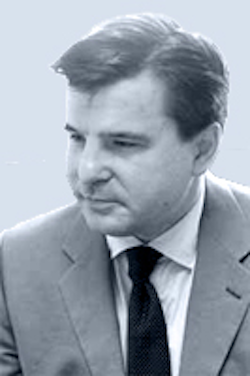
 On Thursday, April 14, at 4:15, Taras Kuzio will join HURI for a lecture and presentation of his new book, Ukraine: Democratization, Corruption and the New Russian Imperialism.
On Thursday, April 14, at 4:15, Taras Kuzio will join HURI for a lecture and presentation of his new book, Ukraine: Democratization, Corruption and the New Russian Imperialism.
A leading expert on Ukraine, Kuzio is a prolific writer and a deeply respected public intellectual. He is currently a senior research associate at the Canadian Institute of Ukrainian Studies, University of Alberta, and a non-resident fellow at the Center for Transatlantic Relations, School of Advanced International Studies, John Hopkins University. Having recently returned from a trip to the Anti-Terrorism Operations (ATO) front lines in Avdiyivka, Kuzio brings both first-hand experience and expert analysis founded on decades of insight and scholarship.
Democratization, Corruption and the New Russian Imperialism
Ukraine: Democratization, Corruption and the New Russian Imperialism surveys Ukrainian modern history from the death of Joseph Stalin in 1953 to the present day. Whereas traditional political science books and articles on contemporary Ukraine begin their analysis in 1991, this volume addresses the Soviet origins of Ukraine’s political and business elites and society, as well as the manner in which Soviet legacies shape contemporary Ukrainian political culture.
The book presents a unique framework for analyzing Ukraine’s history: a series of competing cycles dominated by the promotion of liberalizing ethnic Ukrainian (1920’s, mid-1950s-1960s, mid-1980s-2009 and since 2014) and counter-revolutionary conservative Eurasian and Russophile identities (1930s-early 1950s, 1970s-first half of the 1980s, 2010-2014). Renouncing the traditional dichotomy that pro-Western is good and pro-Russian bad, the volume examines the struggle between Ukraine’s identities, providing a nuanced understanding of Ukrainian thought, behavior, and action.
Beyond the book: Kuzio at HURI
 At the April 14 event, Kuzio will present the research and analysis detailed in his book, focusing on the key points that set the volume apart from traditional political science publications on Ukraine. With the current crisis in Ukraine - Europe’s largest crisis since World War II - still unfolding, the framework Kuzio developed in the book can be used to help understand the events.
At the April 14 event, Kuzio will present the research and analysis detailed in his book, focusing on the key points that set the volume apart from traditional political science publications on Ukraine. With the current crisis in Ukraine - Europe’s largest crisis since World War II - still unfolding, the framework Kuzio developed in the book can be used to help understand the events.
Prior to his talk at HURI, Kuzio will present his paper “Ukraine between a Constrained EU and Assertive Russia” at a workshop (Europe’s Parallel Foreign Policy: The Ukraine-Russia Crisis) at Northeastern University. His recent trip to the ATO front line, where he accompanied volunteers delivering supplies, also fuels fresh commentary on the latest conditions and developments.
The book presentation will take place in the Omeljan Pritsak Memorial Library at HURI, 34 Kirkland Street, at 4:15pm.
Taras Kuzio received a BA in Economics from the University of Sussex, an MA in Soviet and Eastern European Studies from the University of London, and a PhD in Political Science from the University of Birmingham, UK. He was a post-doctoral fellow at the MacMillan Center for International and Area Studies, University of Alberta. Currently, he is a senior research associate at the Canadian Institute of Ukrainian Studies, University of Alberta, and a non-residential fellow at the Center for Transatlantic Relations, School of Advanced International Studies (SAIS), Johns Hopkins University.
Kuzio has served as a consultant to different branches of the US government and prepared expert testimony in political asylum cases. He’s authored and edited 15 books, guest edited several journals, and authored over 100 think tank monographs, book chapters, scholarly articles and 1,400 journalistic articles. His most recent book is Ukraine: Democratization, Corruption and the New Russian Imperialism, while a forthcoming volume on the Ukraine-Russia crisis is the fruit of seven visits to eastern Ukraine and the conflict zone.